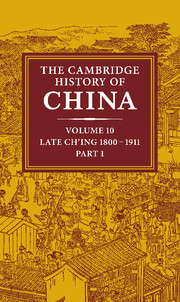Book contents
- Frontmatter
- 1 Introduction: the old order
- 2 Ch'ing Inner Asia c. 1800
- 3 Dynastic decline and the roots of rebellion
- 4 The Canton trade and the Opium War
- 5 The creation of the treaty system
- 6 The Taiping Rebellion
- 7 Sino-Russian relations, 1800–62
- 8 The heyday of the Ch'ing order in Mongolia, Sinkiang and Tibet
- 9 The Ch'ing Restoration
- 10 Self-strengthening: the pursuit of Western technology
- 11 Christian missions and their impact to 1900
- Bibliographical essays
- Bibliography
- Genealogical chart
- Glossary
- Index
- References
6 - The Taiping Rebellion
Published online by Cambridge University Press: 28 March 2008
- Frontmatter
- 1 Introduction: the old order
- 2 Ch'ing Inner Asia c. 1800
- 3 Dynastic decline and the roots of rebellion
- 4 The Canton trade and the Opium War
- 5 The creation of the treaty system
- 6 The Taiping Rebellion
- 7 Sino-Russian relations, 1800–62
- 8 The heyday of the Ch'ing order in Mongolia, Sinkiang and Tibet
- 9 The Ch'ing Restoration
- 10 Self-strengthening: the pursuit of Western technology
- 11 Christian missions and their impact to 1900
- Bibliographical essays
- Bibliography
- Genealogical chart
- Glossary
- Index
- References
Summary
ORIGINS AND DEVELOPMENT
The Taiping Rebellion (1851–64) was in many respects the hinge between China's pre-modern and modern histories. Its gigantic human catastrophes in the interior formed a backdrop for early Sino-Western treaty relations along the coast, and, along with the treaty system itself, gave notice of the imminent collapse of China's traditional order. Some themes of the rebellion had deep historical roots, while others grew from problems peculiar to the Ch'ing period. The enormities of social injustice, the decline of imperial and local administration, and the loss of bureaucratic morale are themes common to dynastic crises. Soaring population growth and massive internal migration were Ch'ing problems whose effects had been felt in social disorder and inter-ethnic conflict since the eighteenth century. Yet foreign contact itself had provided a new historical catalyst: an alien religion that generated a furious assault on China's existing social structure and values. The way this assault was met by the ruling elite conditioned the political and social environment of China's modern history.
The social background
The anarchy that gripped Kwangsi province by the 1840s stemmed partly from the disruptive effects of foreign contact, and partly from the region's unique social complexity. From 1795 to 1809 the south and south-eastern coasts had been scourged by bands of pirates, some sponsored by impecunious rulers of Annam (Vietnam). In Kwangsi these corsairs forged onshore links with Triad chapters (see chapter 3, p. 134), and a complex pattern of outlawry began to emerge. It was not long thereafter that the south China underworld entered the more lucrative field of opium distribution, as the drug traffic began to flourish in the 1820s and 1830s.
- Type
- Chapter
- Information
- The Cambridge History of China , pp. 264 - 317Publisher: Cambridge University PressPrint publication year: 1978
References
- 17
- Cited by



